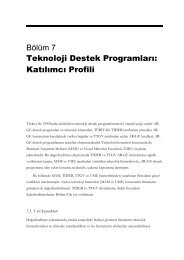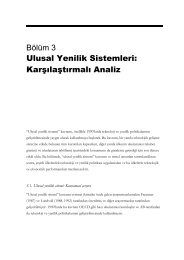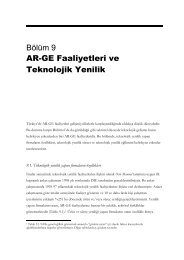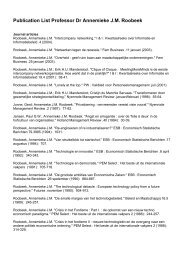Richard Whitley.2
Richard Whitley.2
Richard Whitley.2
You also want an ePaper? Increase the reach of your titles
YUMPU automatically turns print PDFs into web optimized ePapers that Google loves.
http://www.mbs.ac.uk/research/academicdirectory/viewprofile.aspx?sid=5029600; 01 April, 2009Prof <strong>Richard</strong> WhitleyEmail: richard.whitley@mbs.ac.ukPositionProfessor of Organisational Sociology and DirectorThe University on Manchester / Manchester Business SchoolBiography<strong>Richard</strong> Whitley joined Manchester Business School in 1968 after undertaking research at theUniversity of Pennsylvania. He has published extensively on the organisation of the natural andsocial sciences, including The Intellectual and Social Organisation of the Sciences (OxfordUniversity Press 1984, 2000).More recently, he has studied the nature of capitalism in East Asia and Western Europe, as well asresearching the development of firms and markets in Eastern Europe and the development ofinnovation systems. Recent books on these topics have included Business Systems in East Asia(Sage 1992), European Business Systems (Sage 1992), The Changing European Firm (Routledge1996), Governance at Work: The Social Regulation of Economic Relations (Oxford UniversityPress 1997), Divergent Capitalisms: The Social Structuring and Change of Business Systems(Oxford University Press 1999), National Capitalisms, Global Competition and EconomicPerformance (Benjamin, 2000), The Multi-national Firm (Oxford University Press, 2001),Competing Capitalisms (Edward Elgar, 2002) Changing Capitalisms? Internationalization,institutional change and systems of economic organization (Oxford University Press, 2005) andBusiness Systems and Organisational Capabilities: The institutional structuring of compeititivecompetences (Oxford University Press, 2007).He has also edited a special issue of Organization Studies on 'The Institutional Dynamics ofInnovation Systems' (volume 21 (5), 2000), co-edited a special issue of the Journal of ManagementStudies on 'The Changing Multinational Firm' (volume 40 (3) 2003) and co-edited a special issue ofOrganization Studies on 'Institutions, Markets and Organizations' (volume 26 (12) 2005). <strong>Richard</strong>has served as co-director of the European Science Foundation's Programme on EuropeanManagement and Organisations in Transition (1993-97); as chair of the European Group forOrganisational Studies (1998-99), and as president of the Society for the Advancement of Socioeconomicsin 1999-2000. In 1998-99 he was Fellow in residence at the Netherlands Institute forAdvanced Study in the Humanities and Social Sciences and in 1999-2000 he was visiting professorat the Institute of Innovation Research, Hitotsubashi University, Tokyo. From 2000-2004 he was aVisiting Professor in Comparative Business Systems at Erasmus University, Rotterdam.Teaching and Research interestsComparative Business Systems; East Asian Business; Innovation patterns in different institutrionalcontexts; International Business and Management; Japan (Japanese Management); Multi-national
Companies; Comparative Organisational Analysis; Changing Public Science Systems; TheRelationship between Knowledge and Practice in the Social and Management Sciences.Authored books• Whitley, R. 2007, Business Systems and Organizational Capabilities: The institutionalstructuring of competitive competences, Oxford University Press.• Whitley, R. 2000, The Intellectual and Social Organization of the Sciences (Second Edition:with new introductory chapter entitled 'Science Transformed? The Changing Nature ofKnowledge Production at the End of the Twentieth Century'), Oxford University Press:Oxford.• Whitley, R. 1999, Divergent capitalisms: the social structuring and change of businesssystems, Oxford University Press: Oxford.Edited books• Whitley, R., Morgan E & Moen E 2005, Changing Capitalisms? Internationalisation,Institutional Change and Systems of Economic Organization, Oxford University Press:Oxford.• Whitley, R. 2002, Competing Capitalisms: institutions and economies, Elgar: Cheltenham.• Whitley, R., Morgan G & Kristensen P H 2001, The Multinational Firm: organising acrossinstitutional and national divides, Oxford University Press: Oxford.• Whitley, R., Quack S & Morgan G 2000, National Capitalisms, Global Competition andEconomic Performance, John Benjamins Publishing Company: Amsterdam.• Whitley, R. & Kristensen P H 1997, Governance at Work: the social regulation of economicrelations in Europe, Oxford University Press: Oxford.• Whitley, R. & Kristensen P H 1996, The Changing European Firm: limits to convergence,Routledge: London.Chapters in books• Whitley, R. 2006, 'Innovation Systems and Institutional Regimes: the construction ofdifferent types of national and transnational innovation systems ( in Lorenz, E. andLundvall, B A. (eds) How Europe's Economies Learn- coordinating competing models)', inE Lorenz and B-A Lundvall (ed.), How Europe's Economies Learn- coordinating competingmodels , Oxford University Press, pp. 343-380.• Whitley, R. 2005, 'Developing Transnational Organisational Capabilities in MultinationalCompanies: institutional constrains on authority sharing and careers in six types of MNC, inMorgan, G. et al (eds) Changing Capitalisms?.', pp. 235-276.• Whitley, R. 2005, 'How National are Business Systems? The Role of States andComplementary Institutions in Standardising Systems of Economic Co-ordination andControl at the National Level, in Morgan, G. et al (eds) Changing Capitalisms ?', pp. 190-231.• Whitley, R. 2003, 'Changing Transnational Institutions and the Management of InternationalBusiness Transactions', Edward Elgar, Cheltenham, pp. 108-133.• Whitley, R. 2002, 'The Institutional Structuring of Market Economies (R Whitley ed)',Edward Elgar, Cheltenham, pp. ix-xxvii.• Whitley, R. 2002, 'Multiple Market Economies: the role of institutions in structuringbusiness systems', Brill, pp. 217-240.• Whitley, R. 2002, 'The Sociology of the Sciences Yearbook: a Personal Retrospective',
Kluwer, Netherlands, pp. 1-9.• Whitley, R. 2001, 'How and Why are International Firms Different? the consequences ofcross-border managerial coordination for firm characteristics and behaviour', OxfordUniversity Press, Oxford, pp. 27-68.• Whitley, R. 2001, 'The Institutional Structuring of Business Transactions', Hart Publishing,Oxford, pp. 73-99.• Whitley, R. 2001, 'National Innovation Systems', Elsevier Science.• Whitley, R. 2001, 'Business Systems (ed M Warner)', Thompson Learning: London, pp.715-728.• Whitley, R. 2000, 'Societal Transformation and Enterprise Change in Eastern Europe: acomparison of Hungary and Slovenia', Peter Lang, pp. 49-78.• Whitley, R. 2000, 'Developing Capitalisms: the comparative analysis of emerging businesssystems in 'the South', Sage, pp. 25-41.• Whitley, R., Hocevar M & Jaklic M 2000, 'Success without shock therapy in EasternEurope: the case of Slovenia', John Benjamins, pp. 291-315.Journal articles• Whitley, R. 2006, 'Understanding Differences: searching for the social processes thatconstruct and reproduce variety in science and economic organisation ', OrganizationStudies, vol. 27, pp. 1153-1177.• Whitley, R. 2006, 'Project-based Firms: new organizational form or variations on a theme?Industrial and Corporate Change, 15.2006.77-99.', Industrial and Corporate Change, vol.15(1), pp. 77-99.• Whitley, R. & Steven Casper 2004, 'Managing Competences in EntrepreneurialTechynology Firms: A comparative institutioinal analysis of Germany, Sweden and the UK',Research Policy, vol. 33, pp. 89-106.• Whitley, R. 2003, 'From the Search for Universal Correlations to the InstitutionalStructuring of Economic Organisation and Change: The devedlopment and fuiture oforganisation studies', Organization, vol. 10, pp. 481-501.• Czaban, L., Whitley, R., Hocevar M & Jaklic M 2003, 'Path Dependence and ContractualRelations in Emergent Capitalism: contrasting state socialist legacies and inter-firm cooperationin Hungary and Slovenia', vol. 24, pp. 7-28.• Whitley, R., Morgan G, Sharpe D & Kelly W 2003, 'The Changing Japanese Multinational:application, adaptation and learning in car production and financial services', vol. 40, pp.639-668.• Whitley, R. 2003, 'Competition and Pluralism in the Public Sciences: the impact ofinstitutional frameworks on the organisation of academic science', vol. 32, pp. 1015-1029.• Whitley, R., Morgan G, Sharpe D & Kelly W 2003, 'Global Managers and JapaneseMultinationals: internationalisation and management in Japanese financial institutions', vol.14, pp. 1-19.• Whitley, R. 2003, 'The Institutional Structuring of Organizational Capabilities: the role ofauthority sharing and organizational careers', Organisation Studies, vol. 24(5), pp. 667-695.• Whitley, R. & Casper, S 2003, 'Managing Competences in Entrepreneurial TechnologyFirms: a comparative institutional analysis of Germany, Sweden and the UK', ResearchPolicy, vol. 33(1), pp. 89-106.• Whitley, R. 2002, 'Developing Innovative Competences: the role of institutionalframeworks', Industrial and Corporate Change, vol. 11(3), pp. 497-528.
• Whitley, R., Morgan G, Sharpe D & Kelly W 2002, 'The Future of Japanese Manufacturingin the UK', vol. 39, pp. 1023-1044.• Czaban, L. & Whitley, R. 2000, 'Incremental Organisational Change in a TransformingSociety: managing turbulence in Hungary in the 1990s', vol. 37, pp. 371-393.• Whitley, R. 2000, 'The Institutional Structuring of Innovation Strategies: business systems,firm types and patterns of technical change in different market economies', vol. 21, pp. 855-886.• Whitley, R. 2000, 'The Institutional Dynamics of Innovation Systems', vol. 21, pp. 855-1004.





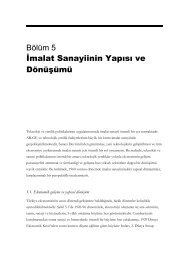
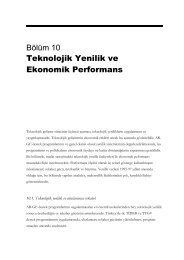


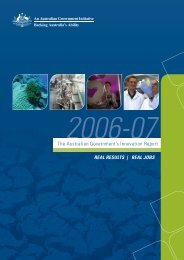
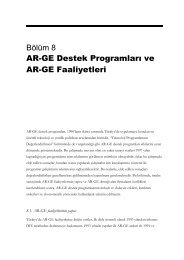

![[Tam] Uygula[ya] - Bilim, Teknoloji ve Ä°novasyon Politikaları TartıÅma ...](https://img.yumpu.com/36820041/1/184x260/tam-uygulaya-bilim-teknoloji-ve-anovasyon-politikalara-tartaama-.jpg?quality=85)
